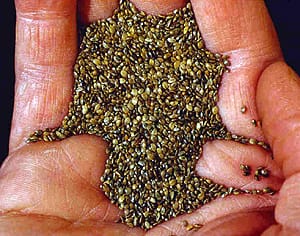Matthew Dillon says failure to invest in seeds tailored for organic farm practice is cheating our food future.
KQED Radio
By Matthew Dillon
 Let’s talk about smart investments.
Let’s talk about smart investments.
The golden rule of successful investing is diversification. Over-investing in one area is not only risky, but also decreases the likelihood of a successful future return.
The same investment philosophy is as true in food as it is in finance.
Our public tax dollars are over-invested in agricultural biotechnology, which is primarily focused on developing genetically engineered or GMO crops. Over a three-year period, agricultural biotech research received 70 times more in federal funds than organic plant breeding.
Let’s put aside the debate over whether genetic engineering has shown any true returns – other than the sale of more herbicides. Let’s simply ask: Why are we putting all of our proverbial eggs in a biotech basket?
To maximize returns on our food future, we must also invest in plant breeding for organic systems. And this means starting with organic seed.
Why does organic seed matter?
The seed farmers sow affects the yield and quality of the food we eat. Plant breeders develop seeds to grow in the environment in which it will be used. If organic farmers plant conventional seed bred to thrive with toxic pesticides and petroleum-based fertilizers, their yields suffer because these chemicals aren’t used in organic systems. This puts them at a severe disadvantage in the field.
With fair and adequate research funding, we can breed seeds more suited to organic farmers’ needs. Research from Washington State University shows that when organic wheat farmers use seeds developed specifically for organic rather than conventional chemical systems, yields are 30 percent greater. Unfortunately, many organic farmers continue to rely on conventionally bred seeds. It’s time to change that.
A healthy food future, like a healthy financial portfolio, requires a diversity of investments. In the case of food, that means greater federal support for organic plant breeding programs.
With a Perspective, I’m Matthew Dillon.
Matthew Dillon is director of Seed Matters, a non-profit that advocates for the improvement and protection of organic seed.

